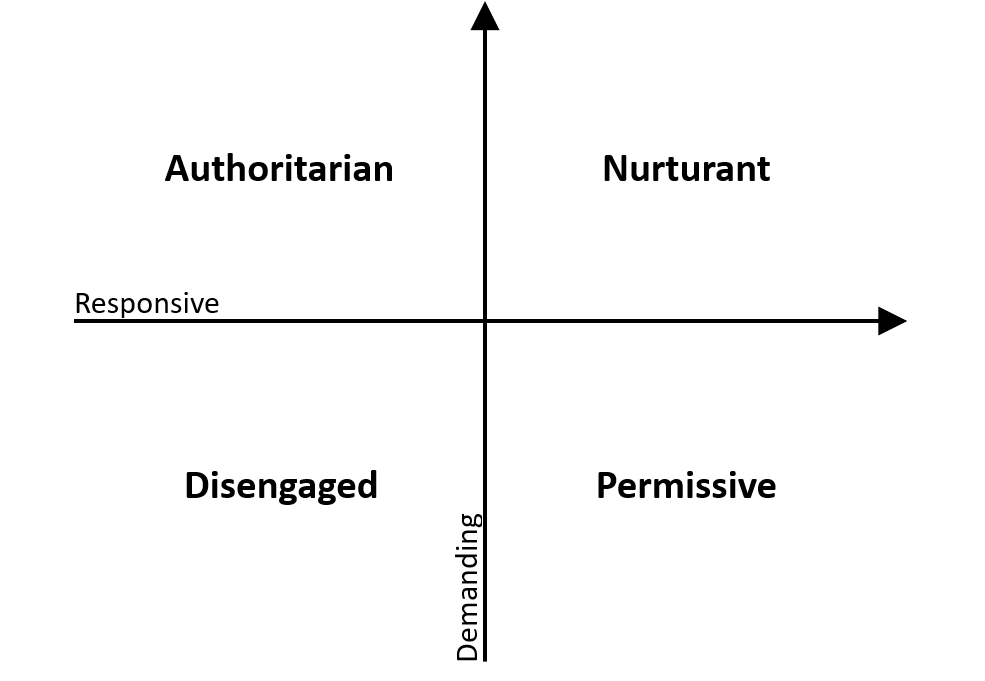Parenting Styles
Parenting Styles
Research and individual counseling regarding parenting typically use a model of parenting styles first introduced by Diana Baumrind in 1966.[1] Based on her work but expanding it slightly, I like to think of four primary parenting styles: Nurturant[2], Authoritarian, Permissive, and Disengaged. These four styles represent the degree to which individual parents are responsive (accepting, responsive, and warm) and demanding (holding high expectations).

Nurturant Parents
Highly responsive parents with high expectations for their children are considered Nurturant. They want their children to develop independence and a sense of responsibility. They give their children tools to help them adjust and grow as they gradually gain new responsibilities and freedoms. These parents explain rules, expectations, and consequences to their children. When discipline is necessary, the goals are to help the child see the ill effects of their behavior and to restore the relationship with the parent lovingly. Parents who use the Nurturant style are responsive to their children and realize that the relationship with their children goes both ways. The parent’s choices, words, and actions affect the child, and the child’s choices, words, and actions affect the parent.
Children who grow up with Nurturant parents realize they are loved and accepted. They want to obey because of this love and acceptance rather than for fear of consequences. They contribute to family life because they feel loved and know their contributions make a difference. They ask questions because they are given meaningful answers and make suggestions because they know their requests will be considered.
As children grow up with Nurturant parents, they are given tools to solve problems and improvise as they face new life challenges. They are not expected to become copies of their parents but to learn to show love and acceptance to others as has been shown to them.
Authoritarian Parents
Highly demanding parents with low responsiveness to their children are considered Authoritarian. They want their children to grow up as responsible societal contributors who follow the rules and respect authority. They have high expectations for compliance with rules and competitive success. Consequences and punishment come strictly with little explanation.
Children who grow up with Authoritarian parents feel they need to earn love. Because they are rarely shown love, they often develop poor self-esteem. They learn not to ask questions because when they get an answer, it is typically “Because I said so.”
Children with Authoritarian parents are more likely to show aggressive behavior towards others, have social difficulty, and exhibit conduct problems. Although they usually become very good at obeying rules, they often have little self-discipline.
Permissive Parents
Highly responsive parents with low expectations for their children are considered Permissive. They believe children must be true to their nature and are afraid to set limits. They are accepting and loving but find it difficult to discipline their children and often make threats of discipline without following through. When attempts to change behavior come, they are typically in the form of bribery rather than expectations.
Permissive parents’ children have few responsibilities and can regulate their behavior most of the time. They have little structure or schedule and are seen as equals, peers, or friends more than as children.
Disengaged Parents
Disengaged parents are neither demanding nor responsive. This category of parents was not in Baumrind’s original classification, and Disengaged parents’ participation in a parenting workshop is doubtful.
This category is essential to consider because many children live in a single-parent homes with one parent Disengaged or utterly absent from their lives. This absence affects the child during childhood and as they become their parents.
Blended Parents
As with most categorization systems, only a few parents will always fit into one category. Most parents exhibit a primary type but will show characteristics of other styles in some situations. Because of this, when considering your primary parenting style, look for features of different styles you occasionally use.
[1] Baumrind, Diana. “Effects of Authoritative Parental Control on Child Behavior.” Child Development 37, no. 4 (1966): 887–907.
[2] John Sanders (Sanders, John. 2020. Embracing Prodigals : Overcoming Authoritative Religion by Embodying Jesus’ Nurturing Grace. Eugene, OR: Cascade Books.) replaces Baumrind’s original term “Authoritative” with “Nurturant” to prevent confusion.
